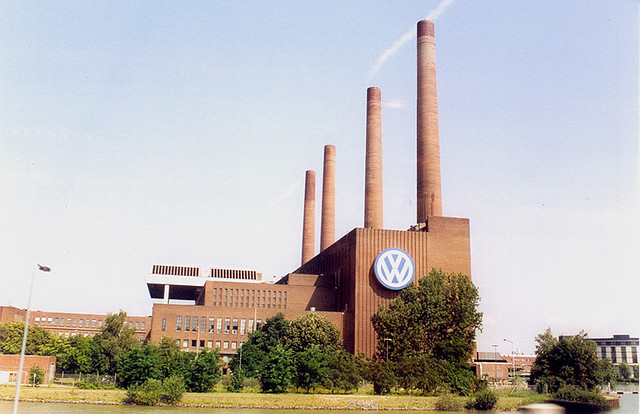The ‘better regulation’ initiative is entrenching corporate dominance over our democracy
Recent revelations about VW cheating emissions tests have underlined the obvious fact that private business interests are not the same as those of the public. Here, Christine Berry describes recent released research by the New Economics Foundation which shows that recent developments have further entrenched the dominance of British and international business over the UK Government.
To see the NEF report ‘Threat to Democracy’, click here.

Credit: Roger W, CC BY SA 2.0
It’s clearer than ever that we need robust, properly enforced and democratic regulation to protect our rights – whether it’s to clean air, safe food, decent work or a healthy environment.
Yet new New Economics Foundation research, released today, reveals that the UK government is putting these rules into the hands of the very same corporations they exist to constrain.
Under the cover of a little-known and innocuous-sounding initiative called ‘Better Regulation’, the entire policy machine is being reshaped around short-term, narrowly-defined business interests – reducing the ‘burden’ of public protections regardless of the long-term costs.
At the same time, those with a vested interest in avoiding effective rules enjoy unprecedented access to the policymaking process.
- Corporate lobbyists and trade associations have been given public money to ‘review’ how enforcement operates in their area – including a review of livestock farm inspections led by the National Farmers’ Union, and a review of imports of fresh produce led by the Fresh Produce Consortium.
- Government departments seeking to introduce new rules must have estimates of the cost to business ‘validated’ by the Regulatory Policy Committee – an unelected body dominated by business interests whose members include an Alderman of the City of London Corporation and a chairman with extensive paid interests in the energy industry.
- Whole areas of regulation have been taken out of the hands of independent watchdogs and replaced with ineffective voluntary schemes overseen by industry-dominated bodies – such as the ‘public health responsibility deal’, which has handed efforts to reduce salt and sugar in food to a group including Tesco, Mars and the Advertising Association.
This is the ultimate privatisation – that of policymaking itself. Just as with the Transatlantic Trade and Investment Partnership (TTIP), democracy is being made accountable to corporations, rather than the other way around.
And it’s happening in plain sight: here it is in the words of former Business Secretary Michael Fallon: “Whitehall is increasingly putting the needs of business centre stage.”
And the website for the ‘Focus on Enforcement’ programme, which states that it “puts scrutiny of the way the law is enforced or implemented into the hands of business”.
Or, perhaps most starkly, Chancellor George Osborne, speaking to the Institute of Directors:
“Delivering this will not be easy. The forces of stagnation will try to stand in the way of the forces of enterprise. For every line item of public spending, there will be a union defending it. For every regulation on business, a pressure group to defend it. Your voice, the voice of business, needs to go on being heard in the battle.”
If you’re a trade unionist or campaigner trying to protect workers, consumers or the environment, you’re a dangerous influence that needs to be neutralised. But if you’re a corporate lobbyist, paid to defend the interests of your clients, you will be welcomed into the corridors of power with open arms.
Moves to set up a register of lobbyists are meaningless when those same lobbyists are being actively invited to write their own rules, often with public funds and without public knowledge.
Even more worryingly, this agenda is now being exported to Europe as part of David Cameron’s renegotiation strategy. Backed up by the threat of Brexit, European institutions are being asked to copy the UK example, straitjacketing democratically elected lawmakers and giving business a privileged place at the table.
Yesterday the Observer revealed how big tobacco, a key supporter of these new measures, has already used them to delay the introduction of plain packaging.
European civil society is fighting back – but it urgently needs support from its UK counterparts. It’s time for us all to wake up to this quiet takeover and start defending our rights and protections. And if you don’t agree with the bargains being made on your behalf in Brussels, it’s time to stand up and say so.
—
This post originally appeared on the New Economics Foundation website and is reposted with permission. It represents the views of the author and not those of Democratic Audit or the LSE. Please read our comments policy before posting.
—
 Christine Berry is Senior Researcher & Programme Manager in Economy and Finance. Her NEF profile can be found here.
Christine Berry is Senior Researcher & Programme Manager in Economy and Finance. Her NEF profile can be found here.





 Democratic Audit's core funding is provided by the Joseph Rowntree Charitable Trust. Additional funding is provided by the London School of Economics.
Democratic Audit's core funding is provided by the Joseph Rowntree Charitable Trust. Additional funding is provided by the London School of Economics.
The ‘better regulation’ initiative is entrenching corporate dominance over our democracy : Democratic Audit UK https://t.co/bR16ieAK46
The ‘better regulation’ initiative is entrenching corporate dominance over our democracy https://t.co/syIGwcALrA
The ‘better regulation’ initiative is entrenching corporate dominance over our democracy https://t.co/jSEWlyJbeb
The ‘better regulation’ initiative is entrenching #corporate dominance over UK democracy https://t.co/VvzuaKDwWY #VWGate
The ‘better regulation’ initiative is entrenching corporate dominance over our democracy https://t.co/4RG4BOhzCo